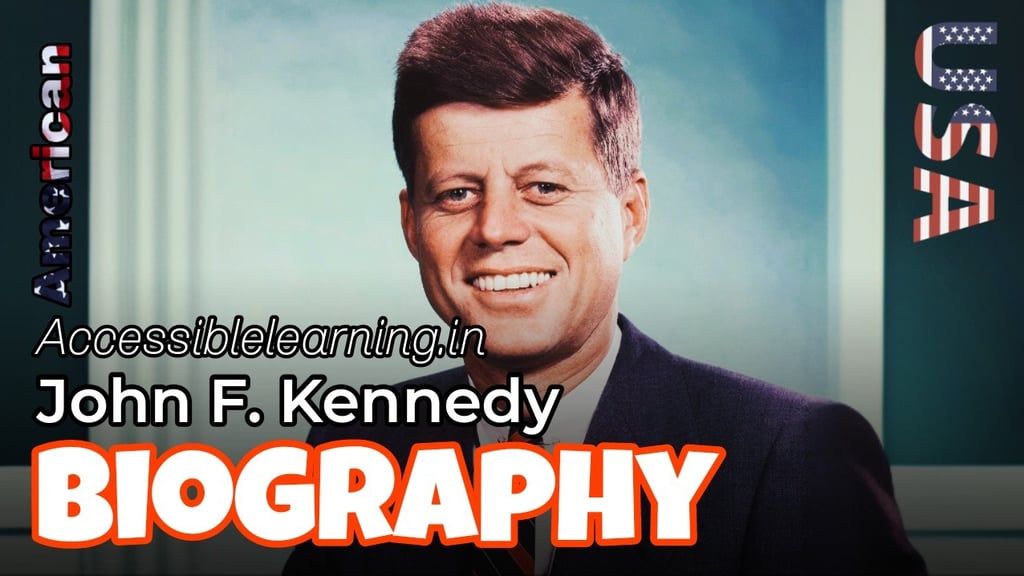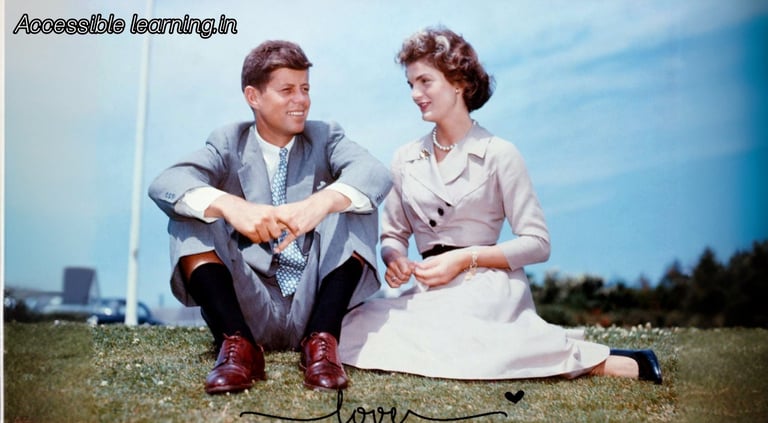
John F. Kennedy: A Legacy of Leadership, Vision, and Tragedy
Explore the life and legacy of John F. Kennedy, America's 35th President. Discover his leadership, vision, and the impact of his presidency, from the Cuban Missile Crisis to the space race!
THE GREAT LEADERUSABIOGRAPHYPOLITICAL JOURNEY
Kim Shin
8/31/20246 min read


John F. Kennedy, often remembered as one of America's most charismatic and visionary leaders, served as the 35th president of the United States. Though his term was tragically cut short, he left an indelible mark on the country and the world. Born into a prominent political family, JFK's life was a mix of privilege, service, and intense devotion to his country. This biography explores his life from his early years to his untimely death and highlights the lasting legacy he left behind.
Early Life and Education!
John Fitzgerald Kennedy was born on May 29, 1917, in Brookline, Massachusetts, the second of nine children in the influential Kennedy family. His father, Joseph P. Kennedy Sr., was a successful businessman and diplomat, and his mother, Rose Fitzgerald Kennedy, was very active religiously and socially. The Kennedy family was one where politics, public service, and a fierce competitive spirit were central themes, which shaped John's character from a young age.
Kennedy was educated at prestigious schools, including the Choate School and later Harvard University, where he majored in government and international relations. His academic life was characterized by both deep intellectual curiosity and playful humor. At Harvard, he wrote a senior thesis called Appeasement at Munich, which was published in 1940 as a book called Why England Slept, earning him early recognition for his insights into global affairs.
Military Service and Heroism
During World War II, Kennedy served in the U.S. Navy, where he commanded a Patrol Torpedo (PT) boat in the Pacific. In 1943, his boat, PT-109, was hit by a Japanese destroyer. Despite serious injuries, Kennedy displayed extraordinary courage by leading his crew to safety. He swam several miles to a nearby island, where he pulled an injured crew member ashore by holding the strap of his life jacket in his teeth. This act of heroism earned him the Navy and Marine Corps Medal and later became a key element of his political narrative, symbolizing his bravery and leadership under pressure.
Political Rise: From Congressman to Senator
After the war, Kennedy's political career began in earnest. Encouraged by his family, he ran for and won a seat in the U.S. House of Representatives from Massachusetts in 1946. His tenure as a member of Congress was known for his advocacy for housing and veterans' benefits, reflecting his commitment to improving the lives of ordinary Americans. In 1952, he ran for the U.S. Senate, defeating popular Republican Henry Cabot Lodge Jr. Kennedy's Senate career was known for his work on labor issues and his strong stances on foreign policy, particularly his criticism of French colonialism in Vietnam.


Marriage and Family Life
In 1953, Kennedy married Jacqueline Bouvier, a refined and cultured woman who became one of the most beloved First Ladies in American history. The couple had three children: Caroline, John Jr., and Patrick, although Patrick tragically died shortly after birth. The Kennedy couple captured the public's imagination with their youthful energy, elegance, and image of an ideal American family, which was often referred to as "Camelot" after Kennedy's death.
Jacqueline Kennedy played a key role in shaping her husband's public image, organizing cultural events at the White House and overseeing its restoration, which included the preservation of historic artifacts and décor. Her influence extended beyond the White House, as she became an international icon of style, grace, and cultural sophistication.
The Road to the Presidency
In 1960, John F. Kennedy announced his candidacy for president, running on a platform promising to revive America's economy, confront the threat of communism, and address pressing social issues. His campaign was unprecedented, particularly in its use of television as a medium to reach voters. The televised debates between Kennedy and his opponent, Vice President Richard Nixon, are often credited with giving Kennedy the edge he needed to win the election. His calm demeanor and charismatic presence contrasted with Nixon's more serious and weary appearance, tilting public opinion in his favor.
Kennedy's narrow victory in the 1960 election made him the youngest elected president in U.S. history and the first Roman Catholic to hold the office. His victory symbolized a generational shift in American politics, with Kennedy representing a new, more dynamic approach to leadership.
Presidency: Challenges and Achievements
Kennedy's presidency saw many important events and initiatives that determined the course of American history. One of his first major challenges was the Bay of Pigs invasion in 1961, a failed attempt by Cuban exiles to overthrow Fidel Castro's communist regime in Cuba, which was supported by the U.S. government. The failure of the operation was a major embarrassment for the Kennedy administration, but JFK took full responsibility for the debacle, which boosted his credibility among the American public.
The following year, the Cuban Missile Crisis brought the world to the brink of nuclear war. In October 1962, U.S. spy planes discovered Soviet missile sites in Cuba capable of launching nuclear weapons against the United States. Kennedy's administration responded with a naval blockade of Cuba and intense diplomatic negotiations with the Soviet Union. The crisis was eventually resolved when the Soviet Union agreed to destroy the missile sites in exchange for a U.S. promise not to invade Cuba and the secret removal of U.S. missiles from Turkey. Kennedy was widely praised for his combination of firmness and diplomacy in handling the crisis, which averted potential disaster.
Domestically, Kennedy was a strong supporter of civil rights, though progress was often slow and faced significant resistance. He proposed comprehensive civil rights legislation, which was later passed under President Lyndon B. Johnson after Kennedy's death. Kennedy also focused on social programs, including an expansion of unemployment benefits, aid to economically distressed areas, and the establishment of the Peace Corps, which sent American volunteers abroad to aid education, health, and economic development in developing countries.
Kennedy's commitment to space exploration is perhaps one of his most lasting legacies. In 1961, he set the ambitious goal of landing a man on the Moon by the end of the decade, a challenge that energized the nation and led to the successful Apollo 11 mission in 1969. His approach to space exploration was not only about scientific achievement, but also about demonstrating American technological superiority during the Cold War.


Assassination and Aftermath!
On November 22, 1963, John F. Kennedy was assassinated while riding a motorcade through Dealey Plaza in Dallas, Texas. His death shocked the nation and the world, leaving the country in mourning. The assassination was followed by an investigation by the Warren Commission, which concluded that Lee Harvey Oswald had acted alone. However, numerous conspiracy theories have persisted over the years, leading to continued debate and speculation about the true circumstances surrounding his death.
Kennedy's assassination brought an end to an era in American politics, an era that many remember for its sense of hope and optimism. The image of a young President JFK with a vision of a better future has become an enduring symbol of American idealism.
Legacy: A Lasting Impact!
John F. Kennedy's legacy is multifaceted and continues to influence American politics and culture. His call for service, exemplified in his famous inaugural address, "Ask not what your country can do for you—ask what you can do for your country," inspired generations of Americans to engage in public service and civic duty. His vision for a more just and equitable society laid the groundwork for the advancement of civil rights, and his commitment to space exploration set the United States on a path of scientific and technological leadership.
Kennedy's presidency also significantly changed the way the American public viewed the role of the federal government in addressing social issues. His efforts to combat poverty, support education, and promote equal rights helped shape the platform of the modern Democratic Party and continue to resonate in contemporary political discourse.
A biography of John F. Kennedy is not just an account of his life but a reflection on the ideals he espoused and the profound impact he had on the world. His leadership during some of the most critical moments in modern history, his commitment to civil rights, and his vision for space exploration and global peace have left a lasting legacy. Though his life was tragically cut short, the principles he stood for—courage, service, and a vision for a better world—continue to inspire and guide us today.
Kennedy remains a timeless figure in American history, symbolizing the promise of a brighter future and the enduring power of leadership rooted in compassion and vision. His life, though brief, was a testament to what can be achieved when one dedicates themselves to the service of others and the pursuit of the greater good.
Subscribe to our newsletter
All © Copyright reserved by Accessible-Learning
| Terms & Conditions
Knowledge is power. Learn with Us. 📚


